[English] 日本語
 Yorodumi
Yorodumi- PDB-8qea: Ultrafast structural transitions in an azobenzene photoswitch at ... -
+ Open data
Open data
- Basic information
Basic information
| Entry | Database: PDB / ID: 8qea | |||||||||||||||
|---|---|---|---|---|---|---|---|---|---|---|---|---|---|---|---|---|
| Title | Ultrafast structural transitions in an azobenzene photoswitch at near-atomic resolution: 96 fs structure | |||||||||||||||
 Components Components |
| |||||||||||||||
 Keywords Keywords | CELL CYCLE / Complex | |||||||||||||||
| Function / homology |  Function and homology information Function and homology informationpositive regulation of axon guidance / microtubule-based process / cytoplasmic microtubule / cellular response to interleukin-4 / structural constituent of cytoskeleton / microtubule cytoskeleton organization / neuron migration / mitotic cell cycle / double-stranded RNA binding / microtubule cytoskeleton ...positive regulation of axon guidance / microtubule-based process / cytoplasmic microtubule / cellular response to interleukin-4 / structural constituent of cytoskeleton / microtubule cytoskeleton organization / neuron migration / mitotic cell cycle / double-stranded RNA binding / microtubule cytoskeleton / Hydrolases; Acting on acid anhydrides; Acting on GTP to facilitate cellular and subcellular movement / microtubule / cilium / protein heterodimerization activity / GTPase activity / ubiquitin protein ligase binding / GTP binding / metal ion binding / cytosol / cytoplasm Similarity search - Function | |||||||||||||||
| Biological species | synthetic construct (others) | |||||||||||||||
| Method |  X-RAY DIFFRACTION / X-RAY DIFFRACTION /  FREE ELECTRON LASER / FREE ELECTRON LASER /  MOLECULAR REPLACEMENT / Resolution: 1.8 Å MOLECULAR REPLACEMENT / Resolution: 1.8 Å | |||||||||||||||
 Authors Authors | Weinert, T. / Wranik, M. / Seidel, H.-P. / Church, J. / Steinmetz, M.O. / Schapiro, I. / Standfuss, J. | |||||||||||||||
| Funding support |  Switzerland, 4items Switzerland, 4items
| |||||||||||||||
 Citation Citation |  Journal: To Be Published Journal: To Be PublishedTitle: Ultrafast structural transitions in an azobenzene photoswitch at near-atomic resolution Authors: Weinert, T. / Wranik, M. / Seidel, H.-P. / Church, J. / Steinmetz, M.O. / Schapiro, I. / Standfuss, J. | |||||||||||||||
| History |
|
- Structure visualization
Structure visualization
| Structure viewer | Molecule:  Molmil Molmil Jmol/JSmol Jmol/JSmol |
|---|
- Downloads & links
Downloads & links
- Download
Download
| PDBx/mmCIF format |  8qea.cif.gz 8qea.cif.gz | 240 KB | Display |  PDBx/mmCIF format PDBx/mmCIF format |
|---|---|---|---|---|
| PDB format |  pdb8qea.ent.gz pdb8qea.ent.gz | 186.6 KB | Display |  PDB format PDB format |
| PDBx/mmJSON format |  8qea.json.gz 8qea.json.gz | Tree view |  PDBx/mmJSON format PDBx/mmJSON format | |
| Others |  Other downloads Other downloads |
-Validation report
| Summary document |  8qea_validation.pdf.gz 8qea_validation.pdf.gz | 1.1 MB | Display |  wwPDB validaton report wwPDB validaton report |
|---|---|---|---|---|
| Full document |  8qea_full_validation.pdf.gz 8qea_full_validation.pdf.gz | 1.1 MB | Display | |
| Data in XML |  8qea_validation.xml.gz 8qea_validation.xml.gz | 48.6 KB | Display | |
| Data in CIF |  8qea_validation.cif.gz 8qea_validation.cif.gz | 67.9 KB | Display | |
| Arichive directory |  https://data.pdbj.org/pub/pdb/validation_reports/qe/8qea https://data.pdbj.org/pub/pdb/validation_reports/qe/8qea ftp://data.pdbj.org/pub/pdb/validation_reports/qe/8qea ftp://data.pdbj.org/pub/pdb/validation_reports/qe/8qea | HTTPS FTP |
-Related structure data
| Related structure data |  8ql2C 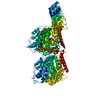 8ql3C  8ql4C 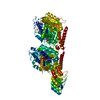 8ql5C 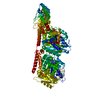 8ql6C 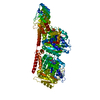 8ql7C 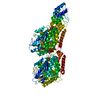 8ql8C  8ql9C  8qlaC 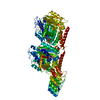 8qlbC C: citing same article ( |
|---|---|
| Similar structure data | Similarity search - Function & homology  F&H Search F&H Search |
- Links
Links
- Assembly
Assembly
| Deposited unit | 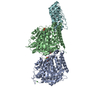
| ||||||||
|---|---|---|---|---|---|---|---|---|---|
| 1 |
| ||||||||
| Unit cell |
|
- Components
Components
-Protein , 3 types, 3 molecules ABF
| #1: Protein | Mass: 50204.445 Da / Num. of mol.: 1 / Source method: isolated from a natural source / Source: (natural)  |
|---|---|
| #2: Protein | Mass: 49999.887 Da / Num. of mol.: 1 / Source method: isolated from a natural source / Source: (natural)  |
| #3: Protein | Mass: 18068.439 Da / Num. of mol.: 1 Source method: isolated from a genetically manipulated source Source: (gene. exp.) synthetic construct (others) / Production host:  |
-Non-polymers , 5 types, 522 molecules 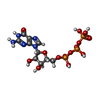








| #4: Chemical | | #5: Chemical | #6: Chemical | ChemComp-CA / | #7: Chemical | ChemComp-IBL / | #8: Water | ChemComp-HOH / | |
|---|
-Details
| Has ligand of interest | Y |
|---|
-Experimental details
-Experiment
| Experiment | Method:  X-RAY DIFFRACTION / Number of used crystals: 1 X-RAY DIFFRACTION / Number of used crystals: 1 |
|---|
- Sample preparation
Sample preparation
| Crystal | Density Matthews: 2.55 Å3/Da / Density % sol: 51.81 % |
|---|---|
| Crystal grow | Temperature: 293 K / Method: vapor diffusion, hanging drop Details: 0.2M Ammonium sulfate, 0.1M Bis/Tris-methane pH=5.5, 21% PEG 3000 (m/v) |
-Data collection
| Diffraction | Mean temperature: 293 K / Serial crystal experiment: Y |
|---|---|
| Diffraction source | Source:  FREE ELECTRON LASER / Site: SwissFEL ARAMIS FREE ELECTRON LASER / Site: SwissFEL ARAMIS  / Beamline: ESA / Wavelength: 1 Å / Beamline: ESA / Wavelength: 1 Å |
| Detector | Type: PSI JUNGFRAU 16M / Detector: PIXEL / Date: Sep 18, 2020 |
| Radiation | Monochromator: none / Protocol: SINGLE WAVELENGTH / Monochromatic (M) / Laue (L): M / Scattering type: x-ray |
| Radiation wavelength | Wavelength: 1 Å / Relative weight: 1 |
| Reflection | Resolution: 1.7→11.08 Å / Num. obs: 123943 / % possible obs: 99.999 % / Redundancy: 203.7 % / CC1/2: 0.95 / CC star: 0.99 / R split: 0.219 / Net I/σ(I): 3.45 |
| Reflection shell | Resolution: 1.7→1.75 Å / Redundancy: 86.8 % / Mean I/σ(I) obs: 0.51 / Num. unique obs: 12354 / CC1/2: 0.18 / CC star: 0.552 / R split: 2.35 / % possible all: 100 |
| Serial crystallography sample delivery | Method: injection |
| Serial crystallography sample delivery injection | Carrier solvent: HEC / Injector nozzle: glas / Jet diameter: 75 µm |
- Processing
Processing
| Software |
| |||||||||||||||||||||||||||||||||||||||||||||||||||||||||||||||||||||||||||||||||||||||||||||||||||||||||
|---|---|---|---|---|---|---|---|---|---|---|---|---|---|---|---|---|---|---|---|---|---|---|---|---|---|---|---|---|---|---|---|---|---|---|---|---|---|---|---|---|---|---|---|---|---|---|---|---|---|---|---|---|---|---|---|---|---|---|---|---|---|---|---|---|---|---|---|---|---|---|---|---|---|---|---|---|---|---|---|---|---|---|---|---|---|---|---|---|---|---|---|---|---|---|---|---|---|---|---|---|---|---|---|---|---|---|
| Refinement | Method to determine structure:  MOLECULAR REPLACEMENT / Resolution: 1.8→9.49 Å / SU ML: 0.24 / Cross valid method: FREE R-VALUE / σ(F): 0 / Phase error: 26.72 / Stereochemistry target values: ML MOLECULAR REPLACEMENT / Resolution: 1.8→9.49 Å / SU ML: 0.24 / Cross valid method: FREE R-VALUE / σ(F): 0 / Phase error: 26.72 / Stereochemistry target values: ML
| |||||||||||||||||||||||||||||||||||||||||||||||||||||||||||||||||||||||||||||||||||||||||||||||||||||||||
| Solvent computation | Shrinkage radii: 0.9 Å / VDW probe radii: 1.1 Å / Solvent model: FLAT BULK SOLVENT MODEL | |||||||||||||||||||||||||||||||||||||||||||||||||||||||||||||||||||||||||||||||||||||||||||||||||||||||||
| Refinement step | Cycle: LAST / Resolution: 1.8→9.49 Å
| |||||||||||||||||||||||||||||||||||||||||||||||||||||||||||||||||||||||||||||||||||||||||||||||||||||||||
| Refine LS restraints |
| |||||||||||||||||||||||||||||||||||||||||||||||||||||||||||||||||||||||||||||||||||||||||||||||||||||||||
| LS refinement shell |
|
 Movie
Movie Controller
Controller


 PDBj
PDBj






